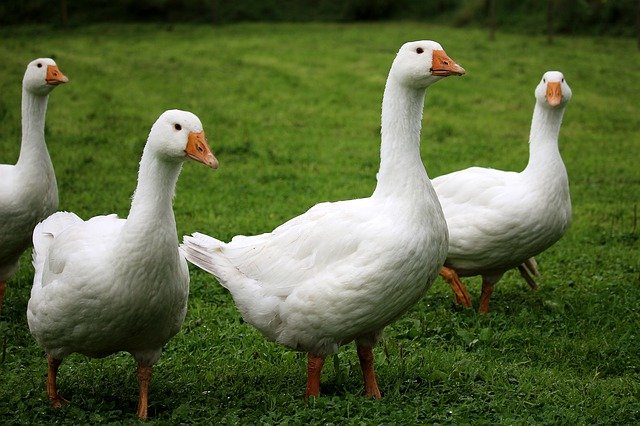ZDG criticizes key points for state animal husbandry labeling

Yesterday, the Federal Minister of Food and Agriculture, Cem Özdemir, presented the cornerstones for mandatory state animal husbandry labeling. In the future, this should clearly indicate how an animal was kept. Özdemir leaves unanswered the question of how farmers who want to convert their barns for better animal welfare can obtain long-term planning security to finance the necessary investments. Friedrich-Otto Ripke, President of the Central Association of the German Poultry Industry (ZDG), sees this as the key weakness of the key issues paper: "As long as German livestock farmers are not clear on how they can finance the conversion, the husbandry label remains an empty promise and can find no implementation in practice.”
Ripke sees politics and trade as having a duty to preserve Germany as a location for livestock. There can only be serious progress in animal welfare if local farmers are taken along. In an international comparison, they are already a role model in terms of quality and animal welfare:
“Animal foods from Germany are incomparably good! Unfortunately, there has been no insight into this for years. Politicians and retailers are not living up to their responsibility to actually push the conversion forward - without there being one-sided burdens on the livestock owners. On the contrary: a national flood of circulation has led to massive cost increases along the entire value chain, and the terrible war of aggression in Ukraine has intensified this development.
Our poultry farmers have not been able to cover their costs for a long time. The rate of farm duties in Germany has recently doubled. These are alarm signals that everyone, especially politicians and retailers, must pay attention to. Because this endangers the food security of the German population.”
Sustainable animal husbandry is only possible with a clear financial framework
According to Ripke, possible solutions are already on the table: "The National Livestock Strategy Competence Group (note: the so-called Borchert Commission) has developed a detailed concept with a broad consensus from science, practice and associations, including concrete recommendations for possible financing. According to estimates, the investment required for the transformation is around four to six billion euros per year. It almost seems like mockery when the current federal budget for 2022 of around 500 billion euros promises just one billion for animal keepers. At the same time, funds totaling 146 billion euros are available for general financial management.
Feeding the German population with food from local production urgently needs to have a higher priority. In recent years, more animal welfare has led to ever lower stocking densities and thus to ever smaller degrees of self-sufficiency. This triggers unwanted imports of food with inferior animal welfare and sustainability values and, in times of insufficient food supply, does not put Germany in a good light internationally. The United Nations is currently forecasting that around 45 million people around the world are at risk of hunger or malnutrition. Therefore, purely national production-restricting requirements would have to be temporarily suspended. That doesn't mean abolishing it.
For me, the food security of the population is not only a moral but also a fundamental duty of politics, comparable to health. With a view to the volume of the federal budget for 2022, the government can certainly think of a better solution than getting caught up in the political minutiae of financing issues and party positions. The traffic light is called upon to find a workable compromise here, because the future-proof animal husbandry that Özdemir advocated will only succeed with a clear long-term financing framework.
A mixed model, behind which the Greens and FDP could also rally, would be, for example, a market-financed animal welfare levy combined with an additional annual allocation of earmarked budget funds by the Federal Ministry of Finance (BMF) to the Federal Ministry of Food and Agriculture (BMEL). For example, Federal Minister Cem Özdemir could guarantee animal owners the necessary long-term reimbursement of additional costs over a period of 20 years. The market will not be able to afford this in the short term. In connection with a regular evaluation of the market share and the real production costs, a secure financing system would be established."
Labeling of origin another important building block
For the success of the plan presented, in addition to husbandry labeling, comprehensive and binding labeling of origin is also required, Ripke emphasizes: "According to surveys, more than 80% of consumers want this transparency for their consumption decisions. The mandatory mark of origin must be developed politically and technically immediately so that it can be applied on January 1, 2023. It is an important basis for financing an animal welfare levy.
Precisely because people in Germany are currently reacting extremely price-sensitively due to inflation and the rising cost of living, politicians and retailers are well advised to look at the realities of the market: For example, 90% of the demand for poultry meat comes from rearing level 2 of the animal welfare initiative. The consumer cannot be pushed into higher and higher levels of husbandry that many simply cannot afford.”
According to Ripke, it is precisely for this reason that the question of financing, together with the marking of husbandry and origin, is right at the top of the political agenda. Individually and for themselves, the three areas will not find a solution. "Everyone in Berlin politics should finally take a clear stance and implement it quickly! That requires overall responsibility. There is too much at stake,” appeals the ZDG President and long-serving Secretary of State for Agriculture.
About the ZDG
The Central Association of the German poultry industry e. V. represents as a trade roof and top organization, the interests of the German poultry industry at national and EU level towards political, official and professional organizations, the public and abroad. The approximately 8.000 members are organized in federal and state associations.
